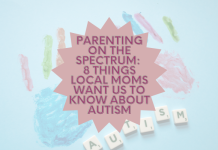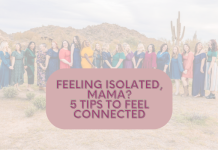There is no manual to supporting a loved one through the roller coaster that is infertility. But it starts with showing up, being a shoulder to lean on and an ear to listen.
My firsthand experience facing infertility started early in my 20’s; newly married, I found out I was pregnant right before my 21st birthday. Shortly after finding out and hearing the heartbeat, I had my first miscarriage at just 10 weeks; I was crushed and devastated.
Little did I know that this would be the first of three losses over the next 10 years and the beginning of my infertility journey.
At that time no one was talking about their struggles with infertility or miscarriage, and I felt so isolated and lonely dealing with this weight alone.
I did, luckily, have some really amazing friends who tried their hardest to support me even though they couldn’t comprehend what I was going through. From states away, they respected my boundaries with conversations and didn’t push me, which helped me talk about things at my own pace.
Having a support system can make the world of a difference when going through infertility. I hold the belief that most people in your life have good intentions and genuinely want the best for you, and their intentions are pure in the attempts to understand and support you in your journey.
It’s also totally acceptable to say that you’re not okay or in a head space to talk about things. Communicating that will also help those around you understand where you are a little better.
If you’re looking for somethings that you can do or say to support someone going through this journey here are a few suggestions that helped me the most:
- Always start by letting them know you care, and you’re here for them
- Do your own research
- Offer to watch their other children (even if it’s just so they can sit and cry after an appointment, struggling with those emotions in front of other kids is not easy to do)
- Support their decision to stop treatment, or to try alternative treatment even if you don’t agree with the cost. (Infertility treatment can be quite pricy, and not covered by all insurance. Their finances are not your concern.)
- Let them know of your own pregnancy, but in a private manner, so they can process their feelings. Give them space to digest your news and understand if they need some space.
Additionally, some things to consider avoiding when supporting a loved one:
- Don’t minimize the problem and condescend when referencing what is going on.
- Don’t tell them to relax, that worse things could happen, or the timing isn’t right.
- Don’t tell them to do or don’t do a specific treatment or to consider adoption. Bets are they are already weighing all options that work for their family.
- Don’t question their want or sadness on having a second (or third or fourth) child. Their choice in the number of children they want is none of your business.
- Don’t avoid the topic when they bring it up, let them talk about whatever is on their heart. Most don’t want to forget what’s happened (especially in the case of miscarriage).
- Do not tell them to try harder or ask whose fault it is (they are already putting enough pressure on themselves they don’t need added pressure from their family or friends).
These are just a few things that can help when trying to be a supportive ear to those going through infertility. One thing I think it’s important to remember is that you don’t have to shy away from bringing it up, or reaching out to say something encouraging, we want to talk about the struggles we are going through and not be dismissed, because even if we don’t talk about it a lot, it does affect every part of our lives.
According to the CDC about 12 percent of women between the ages of 15-44 suffer from infertility and about 20 percent of known pregnancies end in miscarriage. It’s likely the number is much higher if we take into account how many women don’t actually start tracking their fertility until after a loss or more than a year of trying to conceive.
As common as infertility and miscarriage are in today’s world, it’s still one of the least talked about things amongst women. Thankfully, the topic is coming more into mainstream media, between TV shows showing miscarriages to recently some well-known celebrities like Megan Markel and Chrissy Teigan coming out about their losses this past summer. The more we can talk about it and create an open and honest environment, the less isolating it can feel to go through this process.
As contributor Megan shared in a post while going through her own journey with infertility that was so poignant: “I just would hate for none of my loved ones to reach out because they don’t want to say the ‘wrong’ thing, and honestly what really is the right thing? It’s an awful situation to be in and no words magically make it better.”
Imperfect communication is better than none at all.











